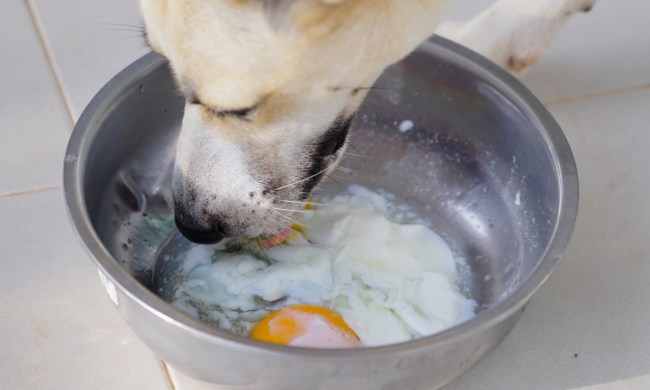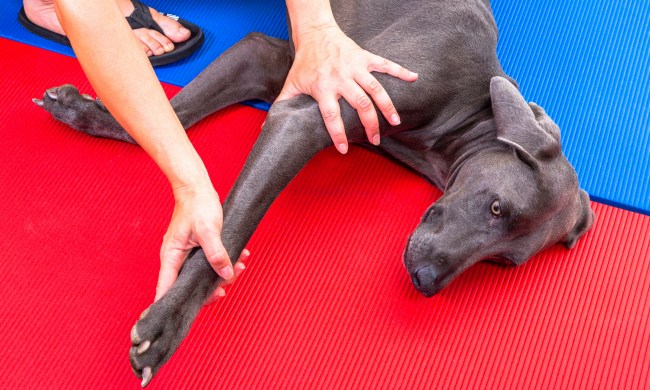That sweet little Mastiff puppy you brought home has grown into a huge, slobbery dog who takes up more than his fair share of almost every space you own. He’d eat you out of house and home if you let him, too.
As dogs go, he’s definitely one of the bigger breeds, with a distinct set of health issues for you to manage. Keeping him on a healthy diet and exercise regimen to maintain his weight and provide nutrition for those hardworking joints and ligaments is extremely important.
Between-meal snacks are a big part of that, and here are the best dog treats for Mastiffs that he’ll love.
Pawstruck Filled Dog Bone
The neighbors might freak out when they see your gentle giant gnawing on a real cow’s femur bone, but let them sweat. They don’t have to know these are purposefully sourced as chew toys and that your pup is only trying to reach the delicious filling inside.
Here’s why we like them:
- Chewing on the bone helps clean teeth by removing plaque and tartar.
- Filling flavors include dog favorites: peanut butter, cheese and bacon, and beef.
- They are made in the U.S. from free-range, grass-fed cattle femur bones.
Cons:
- Some consumers report problems with splintering bones.
- The filling may cause allergic reactions in some pets, so read the ingredients carefully.
HDP Large Roasted Pig Ears
Turning humanely harvested pig ears into dog treats is a sustainable way to use byproducts from the farming industry that would otherwise go to waste. Plus, dogs love to gnaw on them.
Here are a few other reasons we like them:
- Chewing helps remove plaque and tartar from teeth and is good for gum health.
- These treats are irradiated, meaning they have been sterilized to remove pathogens.
- They’re an excellent source of protein, iron, and thiamine.
Cons:
- These treats are high in fat.
- They can cause your already gassy mastiff to be even smellier.
- Swallowing large pieces can cause gastrointestinal obstruction in dogs who consume the treat too quickly.
Wholehearted Boundless Bars Chicken with Mixed Berries
If your mastiff looks at you longingly when you eat a granola bar, don’t relent. Reach for these tasty treats so he can enjoy his own doggie version of what his favorite human is consuming.
We like these treats because they:
- Contain real chicken, oats, grains, and fruit.
- Are easy to carry in a backpack to share on the trail or wherever your adventures take you.
- Are made in the U.S.
Cons:
- Their smaller size makes it easy for your mastiff to eat in one gulp.
- They may cause gastrointestinal problems or itchy skin reactions in dogs with food allergies.
Spot Farms Turkey Meatball Recipe with Cranberries
You can treat your Mastiff just like family with these human-grade treats from Spot Farms.
We like them because:
- They are made with antibiotic-free turkey sourced from farms in Indiana.
- They don’t contain any corn, wheat, soy, artificial flavors, preservatives, or colors.
- They can be used as a snack or crumbled on top of your dog’s meal for an added treat.
- Spot Farms donates 1% of all sales to help support sustainable farming and agriculture in the United States.
Cons:
- The treats contain rolled oats and rice bran, which may cause allergic reactions in dogs with food allergies.
- These human-grade treats smell good enough to eat — but it’s not recommended.
Smartbones Pork Stuffed Twistz
Since mastiffs stay in puppy phase longer than most dogs, these chew toys might help reduce boredom and minimize destructive chewing behavior.
We like them because they:
- Don’t contain any rawhide, so they are more easily digested.
- Promote chewing, which helps maintain healthy teeth and gums.
- Contain a chewy outside with a pork-flavor filling.
Cons:
- Be aware, each stick contains 90 calories, which may exceed the recommended 10% of your dog’s daily caloric intake.
Most veterinarians recommend that treats compose no more than 10% of your dog’s daily caloric intake, so make sure whichever snack you choose is doled out in moderation. And since a full-grown Mastiff can weigh as much as 170 pounds, any extra pounds your gentle giant puts on can be troublesome for his muscles and joints.
The solution? Work with your veterinarian to establish a healthy diet for your mastiff that includes a little whimsy during the day, then pick an appropriate snack. When it comes to feeding treats to your mastiff, the love you give pales in comparison to the love you get to keep.


